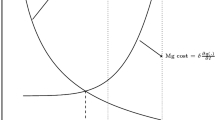Abstract
We examine the relation between a firm’s campaign contributions and lobbying expenditures and its Tobin’s q. We follow other studies that use q to measure the value of the firm’s intangible capital (e.g., the value of advertising, R&D, or environmental performance). Researchers have found a positive and significant relation between intangible assets and q. If political capital exists, it is an intangible asset. However, we find little relation between q and political contributions, suggesting that campaign contributions may not have long term effects on political markets. This is consistent with the view that contributions are done by firms as a response to a short term opportunity not as a way of building long-term political capital.
Similar content being viewed by others
Notes
The increasing importance of lobbying is illustrated by the following (Cummings 2004): “The incident brought home a lesson that had been nagging at Wal-Mart for years. “After decades of explosive growth, the retailer couldn’t continue to expand its empire without abandoning founder Sam Walton’s policy of shunning politics. So, in 1998, the retailer hired its first lobbyist—a retired Air Force lieutenant general—and set out to transform itself from a company without a Washington presence to one that could bend public policy to suit its business needs.”
See Mulherin (2007) for an overview of testing the effects of regulation with capital market data.
For another recent example, see Gleason and Klock (2006).
If we include non-financial regulated industries it does not qualitatively affect the final results. We did not collect data on financial firms because there are significant differences in the way their assets are measured and more importantly the functional form of the effects of contributions and regulation is very different.
For our sample, a Davidson–MacKinnon test (1981), rejected the strict semi-log model in favor of entering number of employees in log form.
Brasher and Lowery (2006), p. 8 describe the data: “Data used for the dependent variables are from the Lobbying Disclosure records publicly available through the U.S. Senate online legislation and records information system. The Lobbying Disclosure Act of 1995 requires that all organizations or contract lobbying firms lobbying either the executive branch or Congress register with the Senate. They are required to report both their total expenditures and the issues for which they lobbied.”
Although the Democrats controlled the White House.
When available, Compustat reported advertising is a more accurate measure of total firm advertising than Leading National Advertisers (LNA). Therefore, as an alternative, we also regressed Compustat advertising values on LNA figures. We then used the predicted values to fill in for missing Compustat values. This did not change our overall findings, and these regressions are not reported.
If we substitute actual market share for Market Leader it does not alter the basic results.
This follows Konar and Cohen (2001). If net value of property, plant and equipment equals gross value, then asset age is new and Asset Age = 0.
However, when Expenditures is regressed on Material Disclosure and other control variables, inclusive of industry effects, the coefficient on Material Disclosure is positive and significant (t = 3.31), as would be expected if firms seek political help in responding to negative events.
References
Ansolabehere, S., de Figeiredo, J., & Snyder Jr., J. (2003). Why is there so little money in U.S. politics. Journal of Economic Perspectives, 17, 105–130.
Brasher, H., & Lowery, D. (2006). The corporate context of lobbying activity. Business and Politics, 8(1), 1–23.
Cooper, M., Gulen, H. & Ovtchinnikov, A. (2007). Corporate political contributions and stock returns. Working paper University of Utah.
Cummings, J. (2004). Wal-Mart opens for business in a tough market: Washington,” Wall Street Journal, March 24, 2004.
Davidson, R., & MacKinnon, J. (1981). Several tests of model specification in the presence of alternative hypotheses. Econometrica, 49(3), 781–793.
de Figueiredo, J., & Tiller, E. (2001). The structure and conduct of corporate lobbying: How firms lobby the Federal Communications Commission. Journal of Economics & Management Strategy, 10(1), 91–122.
Gleason, K., & Klock, M. (2006). Intangible capital in the pharmaceutical industry. Quarterly Review of Economics and Finance, 46(2), 300–314.
Hirsch, B., & Seaks, T. (1993). Functional forms in regression models of Tobin’s q. Review of Economics and Statistics, 75(2), 381–385.
Jayachandran, S. (2006). The Jeffords effect. Journal of Law and Economics, 49(2), 397–426.
Konar, S., & Cohen, M. (2001). Does the market value environmental performance? Review of Economics and Statistics, 83(2), 281–289.
Mulherin, J. H. (2007). Measuring the costs and benefits of regulation: Conceptual issues in securities regulation. Journal of Corporate Finance, 13(2–3), 421–437.
Stratmann, T. (2005). Some talk: Money in politics. A (partial) review of the literature. Public Choice, 124(1), 135–156.
Tullock, G. (1972). The purchase of politicians. Western Economic Journal, 10(3), 534–55.
Ward’s Business Directory (2000). Detroit: Gale Group.
Author information
Authors and Affiliations
Corresponding author
Additional information
We thank Annette Poulsen and Jide Wintoki for comments.
Rights and permissions
About this article
Cite this article
Hersch, P., Netter, J.M. & Pope, C. Do Campaign Contributions and Lobbying Expenditures by Firms Create “Political” Capital?. Atl Econ J 36, 395–405 (2008). https://doi.org/10.1007/s11293-008-9125-y
Received:
Accepted:
Published:
Issue Date:
DOI: https://doi.org/10.1007/s11293-008-9125-y




